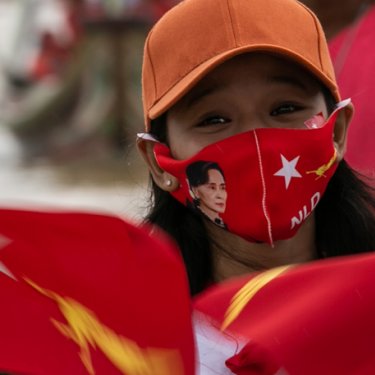Press freedom missing from Myanmar’s parliamentary elections

Reporters Without Borders (RSF) condemns the many press freedom violations that have marked the campaign for Myanmar’s parliamentary elections on 8 November and have already discredited the results.
Press freedom is the big omission of Myanmar’s ten-year-old democratic transition and has been treated with contempt by the current government, led by Aung San Suu Kyi, in the run-up to these elections.
Myanmar’s Union Election Commission imposed prior censorship on all candidates seeking to broadcast campaign speeches on state-run media outlets, effectively barring opposition parties. They were told their speeches would be vetted in advance and could not contain content that “disrespects existing laws and the constitution,” “defames (...) or tarnishes the image of the nation,” or “defames the [armed forces].”
This censorship is all the more shocking because many privately-owned media outlets have been prevented from publishing or broadcasting during the Covid-19 pandemic because the government decided they were not “essential business” and journalists face up to three in prison if they violate the lockdown measures currently in force.
As a result, Myanmar’s voters have been largely denied the media pluralism that should accompany an election campaign.
Compromised legitimacy
“What with journalists imprisoned for criticizing the government or military, dozens of news websites blocked and opposition mouthpieces censored – the press freedom violations are such that they will seriously compromise the legitimacy of the government resulting from Sunday’s elections,” said Daniel Bastard, the head of RSF’s Asia-Pacific desk. “Reform of legislation regulating journalism must be a priority for the next parliament or else Myanmar will leave the path of a transition to democracy for good.”
The penal code inherited from the British colonial era is still widely used to arrest and convict journalists regarded as overly critical. This was seen yet again last May, when Zaw Ye Htet, the editor of the online news agency Dae Pyaw, was sentenced to two years in prison over an article.
During the last two weeks of March 2020, the central government arbitrarily ordered the country’s four Internet operators to block a total of 221 “fake news” websites, as ministerial order described them.
The major press freedom violations marking the outgoing legislative period include the seven-year prison sentences imposed on two Reuters reporters, Kyaw Soe Oo and Wa Lone, whose only crime was investigating a massacre of civilians during the genocide of Rohingyas that began in August 2017.
Myanmar is ranked 139th out of 180 countries in RSF's 2020 World Press Freedom Index.



